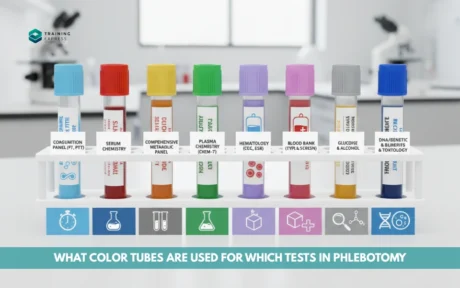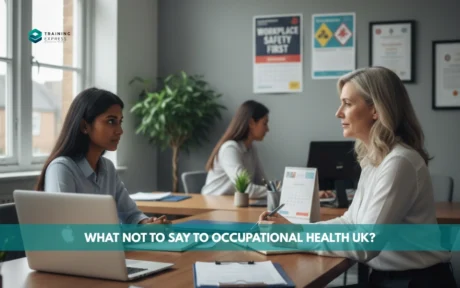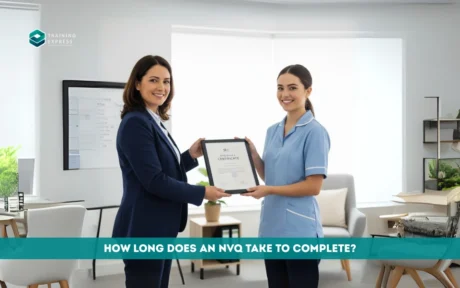

Speech therapy is a treatment for kids and adults with speech and language disorders. Speech and language therapy or Speech-language pathology is an exciting and diverse career. Moreover, it offers you the chance to make a difference. In this blog, you will get a career guide on how to become a speech therapist.
This profession gives you a high degree of flexibility and amazing employment prospects. Also, you’ll work with people every day to help improve their lives.
Table of Contents
Who is a Speech and Language Therapist?
A Speech therapist evaluates, diagnoses, and treats patients with speech, language, or swallowing difficulties. They work with different types of patients, for instance- older stroke victims who are learning again to speak, babies who have trouble swallowing, children with language delays, and people who speak with a stutter.
In addition, they work in a variety of settings, like rehabilitation centres, schools, nursing homes, rural health centres, speech and hearing centres, etc.
Who Needs a Speech Therapist?

Speech therapy is needed to-
- Who is having mild, moderate, or severe learning difficulties
- Kids facing language delay
- Patients who have difficulties in producing sounds
- Patients with hearing impairment
- Those suffering from cleft lip and palate
- People who have stammering issues
- Those who have voice disorders
- People with a language development disorder
- Those suffering from communication or eating and swallowing problems following neurological impairments and degenerative conditions, including stroke, head injury, Parkinson’s disease, and dementia, need a speech therapist.
Is Speech Therapist a Good Career?
Speech and language therapy is certainly the right profession for you if you enjoy Science, education, languages, linguistics, or medicine. Most importantly, it gives you a good enough salary to maintain a standard lifestyle.
Moreover, the demand for speech therapists, especially ones with a masters in speech pathology, is increasing day by day in the UK. That’s why this job has good future prospects
Why Should You Become a Speech Therapist?
Speech and language therapy is a job with a low stress level, good work-life balance, and good scope to improve, get promoted, and earn a higher salary.
Speech-Language therapist job satisfaction is rated in terms of upward mobility, stress level, and flexibility. Moreover, they are loved by people, especially children.
How to become a Speech and Language Therapist?
For working as a speech & language therapist, you have to register with the Health and Care Professions Council (HCPC). For this purpose, you firstly need to complete an approved degree successfully. This degree takes around three to four years. Also, there are some postgraduate programmes, which usually take about two years.
Additionally, a degree apprenticeship standard has been approved in speech and language therapy.
What Qualifications Do You Need to be a Speech and Language Therapist?
To get into a speech and language therapy bachelors course, you usually need the following-
- 2 or 3 A-levels, along with 5 GCSEs (grades A-C)
- English language, Maths and Science courses
Or, another way to enter university is through the following-
- Business and Technology Education Council (BTEC), Higher National Diploma (HND) or Higher National Certificate (HNC), which includes Science
- Relevant National Vocational Qualification (NVQ)
- Access course based on Science
- Equivalent Scottish qualifications
- Equivalent Irish qualifications
In university, you have to take-
Bachelor’s Degree Program:
You will need to complete the Bachelor’s Degree Program. However, it is recommended to gain a bachelor’s degree from a reputable higher education institution.
Courses in speech therapy may have different names, including:
- Speech and language pathology
- Speech Science
- Human communication
- Speech and Hearing
- Audiology & Speech-Language Pathology, etc.
The courses above differ from one another, but all involve practical work with patients.

After graduating from a university, you may join-
SLP Master’s Degree Program
You may be wondering, how many years will it take to become a speech therapist? If you have already achieved the first degree, you can certainly apply for a postgraduate programme in speech & language therapy. These courses usually take two years.
Every institution has its own entry requirements. Therefore, it’s important to check carefully before applying. But, wherever you study, you will need to prove that you have an understanding of speech and language therapy. Meanwhile, you can consider spending some time with a registered speech therapist to see what the work is like.
Once you’ve completed a programme approved by the Health and Care Professions Council successfully, you can apply for registration with the HCPC. Once you register as a professional, you’ll be required to keep your name on the register. But you have to keep your knowledge and skills up to date and pay an annual fee for retention.
Degree Apprenticeship
You can also choose a degree apprenticeship. This will offer you an alternative path to registration with the Health and Care Professions Council. However, there is no set entry requirement for degree apprenticeships.
This will be up to the employer offering the apprenticeship. But, you will require level 3 qualifications if you intend to study at the degree level. Apprenticeships will be with employers who usually post job vacancies on their websites.
Additional Courses
You may join a Speech and language therapy course. It will teach you everything on the topic thoroughly from scratch, so you can achieve a professional certificate. Here is a Speech & Language Therapy course for you. It is a comprehensive, instructor-guided course designed to provide a detailed understanding of the nature of the related sector and your key roles within it.
Personal Characteristics of Speech and Language Therapists
As a speech and language therapist, you should have the following personal characteristics:
- Can work with people of all ages
- Enjoy using language and communication to help people
- Able to motivate people and reassure people
- Also, you enjoy working alone or as a member of a team
What Skills should a Speech and Language Therapist have?
You must possess the following skills to be a language therapist-
- Excellent communication skill
- Ability to influence and motivate people
- Ability to explain the treatment plans to patients
- Business skills for private practice
- Problem-solving skills
- Leadership quality
How to Get a Job as a Speech and Language Therapist?
A speech therapist’s first job after graduate school is a clinical fellowship. For that first year, you have a mentor or an experienced therapist or supervisor who will observe your progress as a clinician.
At the end of your clinical fellowship year, you become a fully-fledged speech-language therapist. So, that first year of fellowship tends to be hard to get as someone supervises you.
However, this networking will help you. You may end up getting a great supervisor, and you will get the opportunity to work where you want to.
What are the Job Responsibilities of a Speech and Language Therapist?
Speech therapists provide life-changing treatment, support, and care for patients who have difficulties talking, eating, and swallowing. Moreover, you’ll help people with physical or psychological issues who have problems speaking and communicating.
Patients from children whose speech is slow to develop to older people whose ability to speak has been impaired by injury or some sort of illness.
However, what a therapist does depends on the setting. Most of them work full time in educational or health care centres like schools, hospitals, nursing places, and speech therapist offices. On the other hand, some of them are also self-employed.

Firstly, if you work in schools, you will spend typical days meeting with parents and teachers discussing a student’s individualised education program. Secondly, you have to meet with students each day, either one-on-one or in small groups, for therapy purposes. Thirdly, you may typically build time into your day for screenings and evaluate students with suspected or diagnosed speech and language difficulties.
You might be able to work with preschoolers. Moreover, you have to receive feedback from the parents of little patients. You will feel tremendous when you see the kids master a skill that they couldn’t perform at all when they began therapy.
If you own a speech therapy centre, a typical day will look a little different. You will see children a day for 45 minutes to an hour of therapy sessions. Also, at the end of the session, you have to speak with parents or guardians about the session. Subsequently, you may recommend patient practice at home.
Finally, you have to supervise the work of your speech and language therapy assistants.
Although the days can be full of tasks, the job is rewarding as you can see children’s smiling faces and their satisfied parents.
How to Become a Speech and Language Therapist Assistant?
Speech and language therapy assistants or Speech-Language Pathology Assistant (SPLA) are the frontline workers helping patients with various conditions that affect their talking, communication, and swallowing, etc.
As a speech therapy assistant, you’ll work under the supervision of speech therapists and assist them in improving the lives of patients with a variety of problems. In like manner, you’ll work closely with teachers, nurses, and other health professionals, for instance- doctors, nurses, and psychologists.
You may work in hospitals, general or special schools, community clinics, or patients’ own homes, etc.

There are no fixed entry requirements for speech and language therapy assistants. Employers expect good literacy and some experience or qualifications in health or social care.
- Firstly, you have to complete a Bachelor’s degree in communication sciences and disorders from an accredited institution. Or,
- Secondly, you can complete a minimum 2-year speech-language pathology assistant (SPLA) program degree from an accredited institution (e.g. degree from a community college or technical training program).
- Thirdly, employers may ask you for GCSEs in English and mathematics. They may ask for National Vocational Qualification, BTEC, or equivalent qualification in health and social care.
- Finally, employers may ask you for relevant work experiences. Even where this is not nationally specified, it would be good if you have worked in healthcare previously.
Obviously, after getting your job, you might become a team leader, supervising the work of other speech therapy assistants after gaining experience. Also, you may apply to train as an assistant practitioner or with the necessary qualifications as a speech and language therapist.
Some speech and language therapy assistants offer a bilingual service because knowing more languages will help you to reach more employers, more patients, and help them.
Training and Development Needed to Become a Speech and Language Therapist Assistant
You will receive the appropriate training to do the job, including your introduction to the department and its procedures.
- You may get an offer to study for qualifications such as:
- NCFE CACHE (Level 2) Healthcare Support Certificate
- NCFE CACHE (Level 3) Diploma Certificate in Healthcare Support Services
- You may get a scope to do an apprenticeship.
- You can take online courses to add more value to your CV.
- Speech Therapy & Language Development
Salary and Benefits
Your standard working hours can be around 40 hours per week and may include a mix of shifts, such as morning, nights, evenings, and weekends.
Your average salary will be around £39k per year. Additionally, you’ll also have access to the pension scheme and health service discounts, as well as annual leave and bank holidays.
Conclusions
Speech therapists are professionals who facilitate outstanding services to society. Moreover, they tend to have job satisfaction, and people love them.
In this blog, you got a career guide on how to become a speech therapist. For more information, Click Here.
- Available Courses
- Animal care10
- Design28
- Training6
- Accounting & Finance Primary49
- Teaching & Academics Primary37
- Teaching23
- Quality Licence Scheme Endorsed171
- Law10
- IT & Software228
- Job Ready Programme52
- Charity & Non-Profit Courses28
- HR & Leadership4
- Administration & Office Skills3
- Mandatory Training36
- Regulated Courses4
- AI & Data Literacy23
- Health and Social Care289
- Personal Development1617
- Food Hygiene116
- Safeguarding79
- Employability287
- First Aid73
- Business Skills293
- Management425
- Child Psychology40
- Health and Safety524
- Hospitality28
- Electronics31
- Construction62
- Career Bundles201
- Marketing39
- Healthcare170

 Food Hygiene
Food Hygiene Health & Safety
Health & Safety Safeguarding
Safeguarding First Aid
First Aid Business Skills
Business Skills Personal Development
Personal Development





